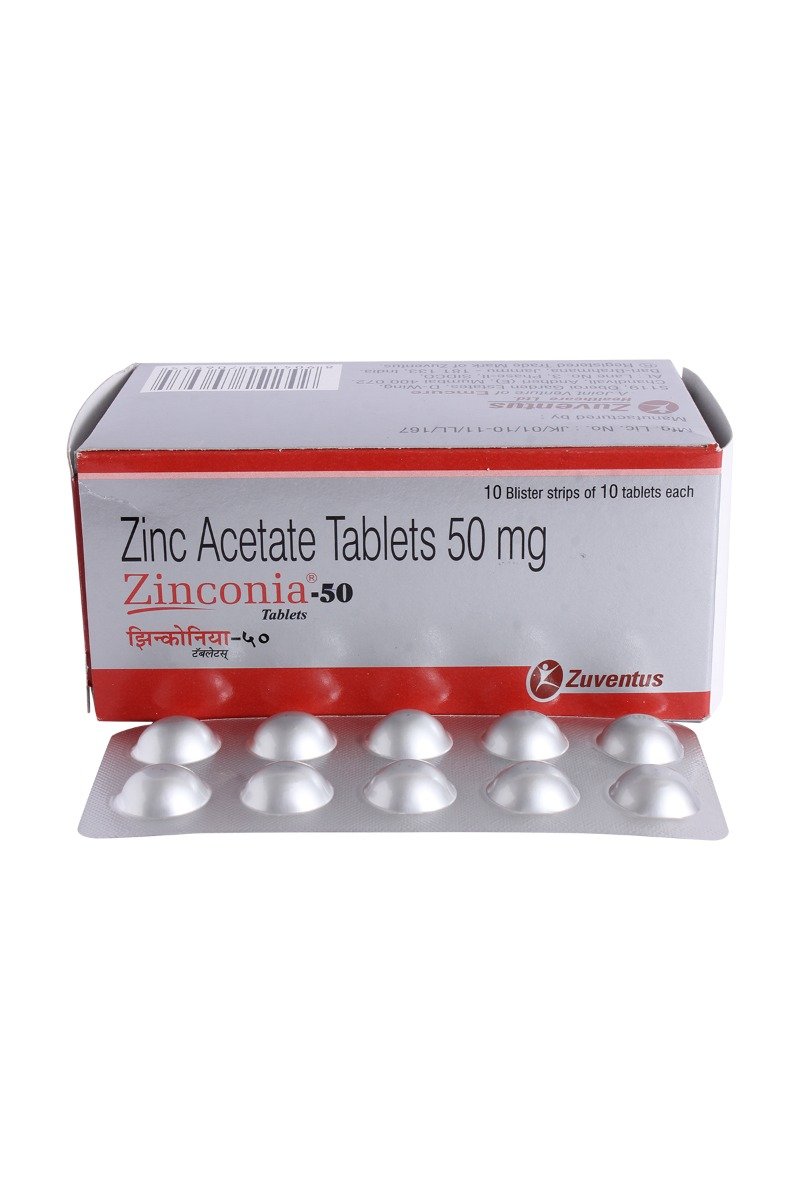Foracort 200 Inhaler 120 mdi

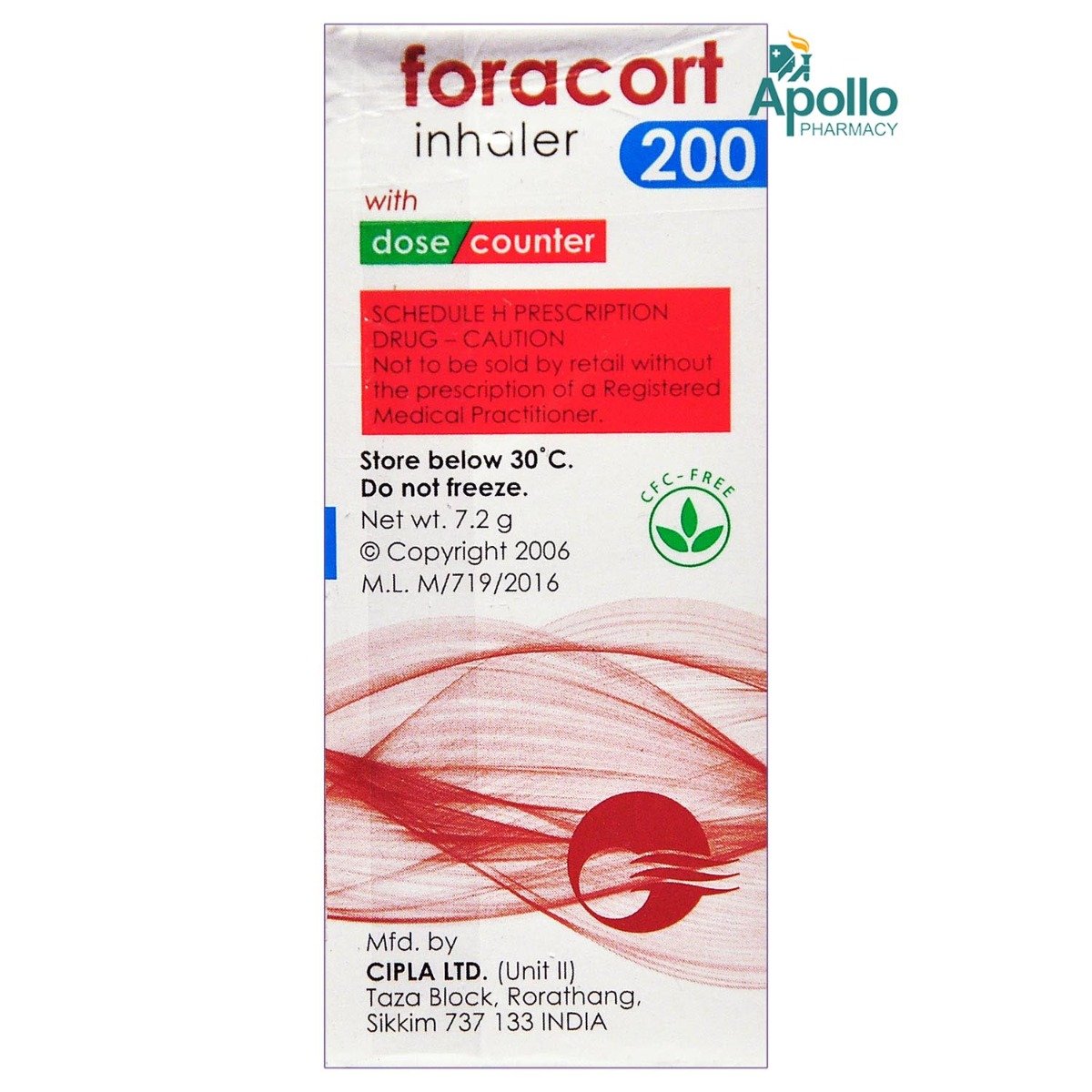
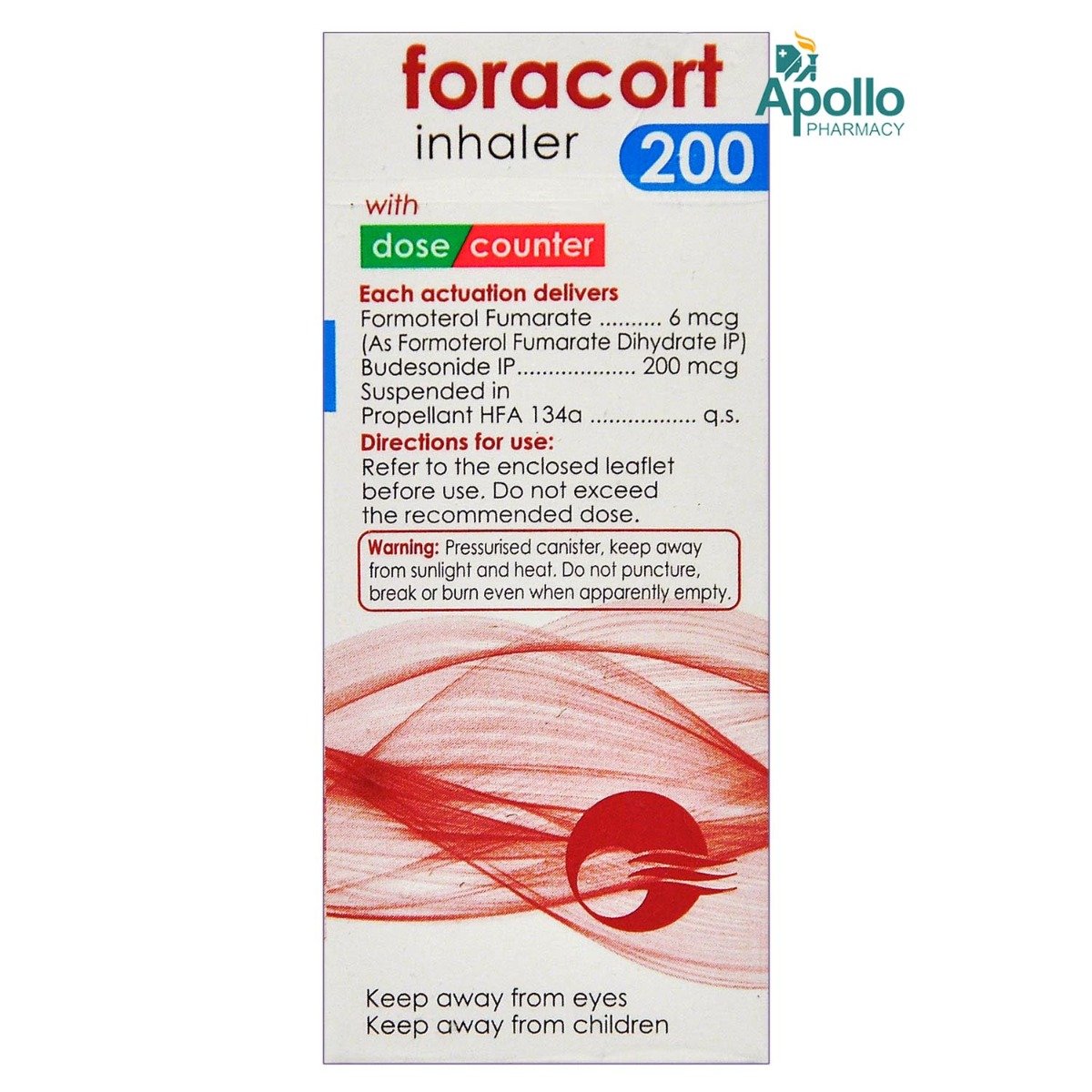

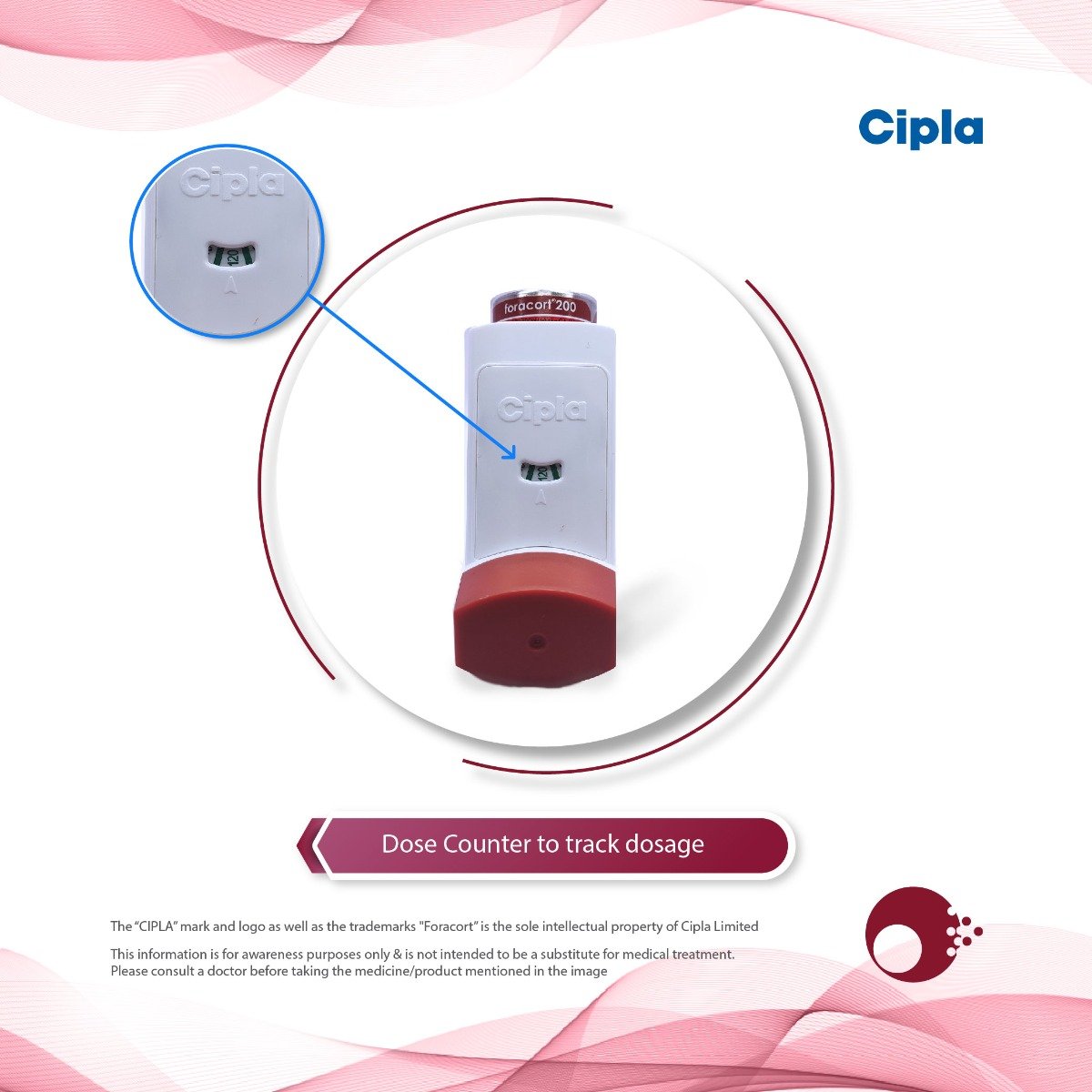

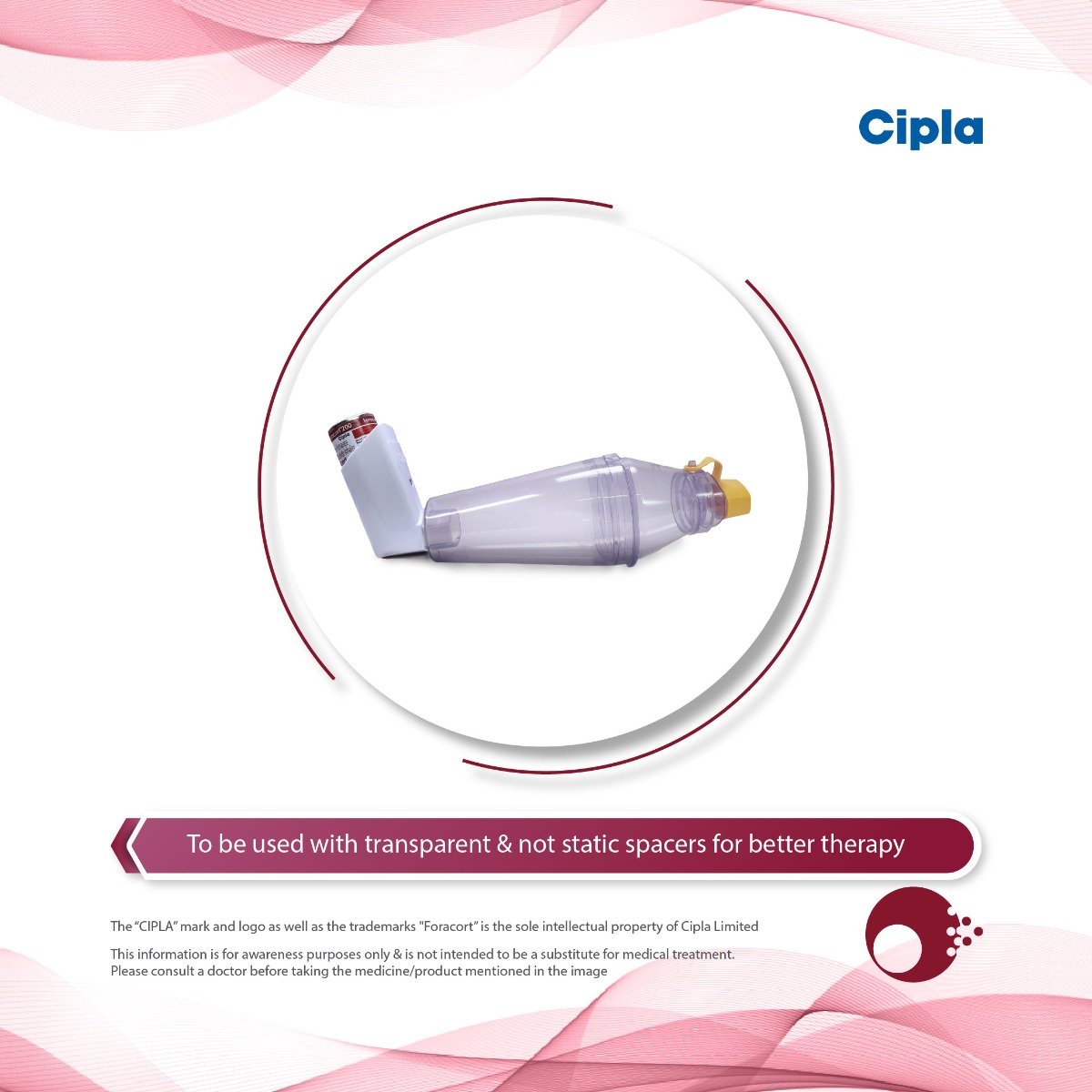

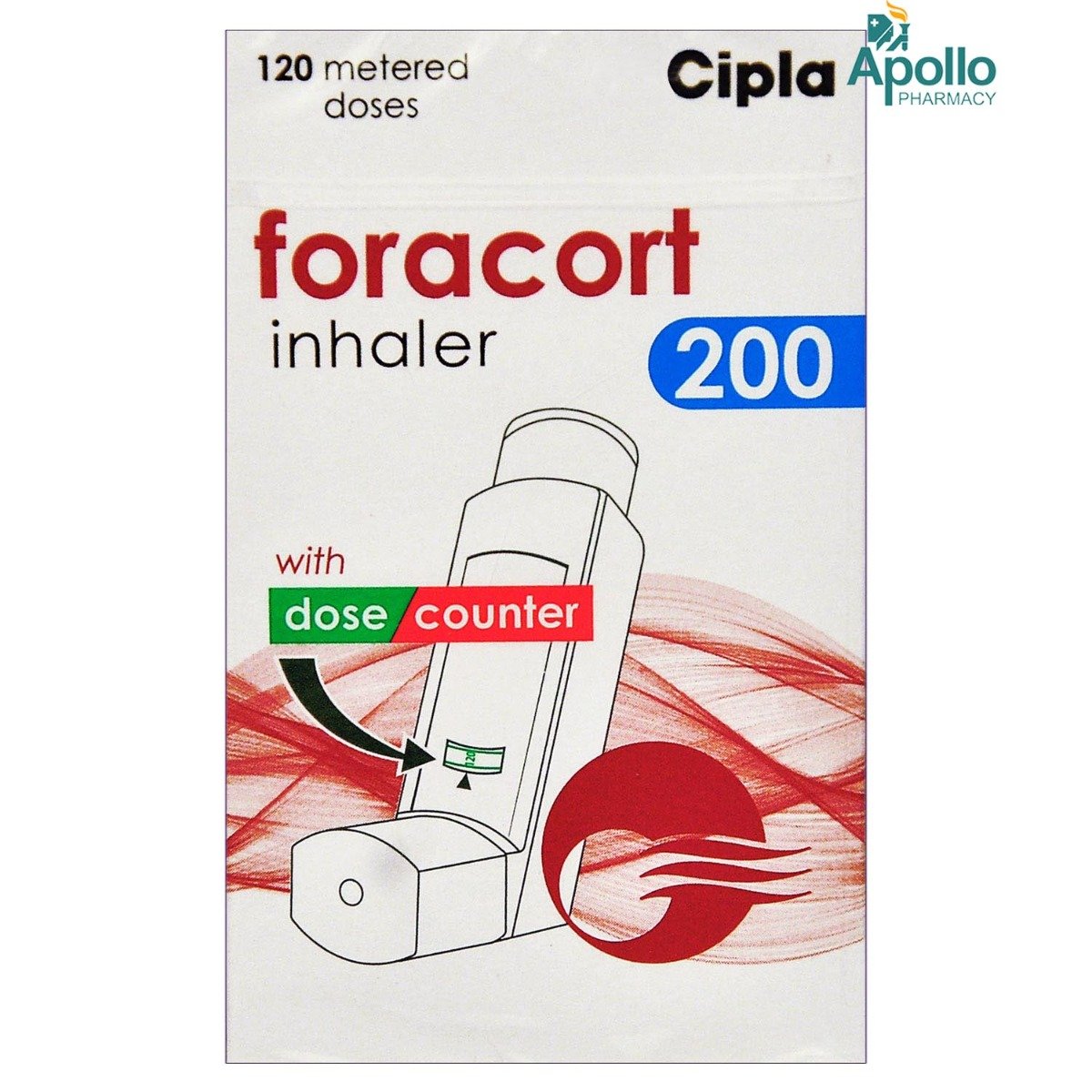
MRP ₹379
(Inclusive of all Taxes)
₹56.9 Cashback (15%)
know your delivery time
Provide Delivery Location
Composition :
Manufacturer/Marketer :
Consume Type :
Expires on or after :
Return Policy :

Secure Payment

Trusted by 8 Crore Indians

Genuine Products
Therapeutic Class
Country of origin
Manufacturer/Marketer address
Author Details
We provide you with authentic, trustworthy and relevant information
Disclaimer
Alcohol
Safe if prescribed
The interaction of Foracort 200 Inhaler 120 mdi with alcohol is unknown. Please consult a doctor before consuming alcohol with Foracort 200 Inhaler 120 mdi.
Pregnancy
Consult your doctor
The safety of Foracort 200 Inhaler 120 mdi in pregnant women is unknown. Therefore, it is given to pregnant women only if the doctor thinks benefits outweigh risks.
Breast Feeding
Consult your doctor
It is unknown whether Foracort 200 Inhaler 120 mdi is excreted in human milk. It is given to breastfeeding mothers only if the doctor thinks benefits are greater than risks.
Driving
Safe if prescribed
Foracort 200 Inhaler 120 mdi usually does not affect your ability to drive or operate machinery.
Liver
Consult your doctor
Use Foracort 200 Inhaler 120 mdi with caution, especially if you have a history of Liver diseases/conditions. The dose may be adjusted by your doctor as required.
Kidney
Consult your doctor
If you have any concerns regarding the use of Foracort 200 Inhaler 120 mdi in patients with Kidney problems, please consult a doctor.
Children
Safe if prescribed
Foracort 200 Inhaler 120 mdi is not recommended for children below 6 years as the safety and effectiveness were not established. However, please consult a doctor before giving Foracort 200 Inhaler 120 mdi to children.
About Foracort 200 Inhaler 120 mdi
Foracort 200 Inhaler 120 mdi belongs to the respiratory combination medication primarily used to treat asthma symptoms and chronic obstructive pulmonary diseases (COPD). Asthma is a chronic (long-term) respiratory condition in which airways narrow, swell, and produce extra mucus, leading to difficulty breathing. COPD is a group of lung diseases with emphysema (shortness of breath) and chronic bronchitis (inflammation of the lining of bronchial tubes).
Foracort 200 Inhaler 120 mdi is a combination of two drugs: Budesonide (corticosteroid) and Formoterol fumarate (LABA - long-acting beta-agonists or bronchodilator). Budesonide belongs to the corticosteroids class that works by reducing the irritation and swelling by acting inside the nasal passage and airways lining cells and stops the release of certain chemicals responsible for causing inflammatory reactions and allergies. Thereby, it provides relief from sneezing, runny or blocked nose, and sinus discomfort. On the other hand, Formoterol fumarate belongs to LABA - long-acting beta-agonists or bronchodilators that relax and widen respiratory airways muscles, making it easier for asthma and COPD patients to breathe.
Use Foracort 200 Inhaler 120 mdi as prescribed. Your doctor will recommend how often you need to use Foracort 200 Inhaler 120 mdi based on your medical condition. Some people may experience fungal infection in the mouth, headache, sore throat, hoarse voice, upper respiratory tract infection, flu, cough, back pain, increased heart rate, and trembling. Most of these side effects of Foracort 200 Inhaler 120 mdi do not require medical attention and gradually resolve over time. However, if the side effects persist or worsen, please consult your doctor.
If you are pregnant or breastfeeding, it is advised to inform your doctor before using Foracort 200 Inhaler 120 mdi. Foracort 200 Inhaler 120 mdi is not recommended for children below 6 years of age. If your breathing worsens or you often wake up at night with asthma, experience chest tightness in the morning, please consult a doctor immediately. These might be signs indicating that your asthma is not controlled properly and requires an alternate or additional treatment. Regular monitoring of potassium levels is recommended while taking Foracort 200 Inhaler 120 mdi as it may cause low potassium levels in the blood.
Uses of Foracort 200 Inhaler 120 mdi
Medicinal Benefits Mweb
Key Benefits
Foracort 200 Inhaler 120 mdi is a combination of two drugs, namely: Budesonide and Formoterol fumarate used to treat asthma and chronic obstructive pulmonary diseases (COPD). Budesonide belongs to the class of corticosteroids that works by reducing the irritation and swelling by acting inside cells of the nasal lining and stops the release of certain chemicals in the body that cause inflammatory reactions. Thereby, it provides relief from sneezing, runny or blocked nose, and sinus discomfort. Formoterol fumarate belongs to the class of bronchodilators that works by relaxing muscles and widening the airways of the lungs. Thus, it makes breathing easier.
Directions for Use
Side Effects of Foracort 200 Inhaler 120 mdi
- Fungal infection in the mouth
- Headache
- Sore throat, hoarse voice
- Upper respiratory tract infection
- Flu, cough
- Back pain
- Increased heart rate
- Shaking or trembling
Drug Warnings
If you are allergic to lactose, Foracort 200 Inhaler 120 mdi or any other ingredients, please tell your doctor. If you are pregnant or breastfeeding, it is advised to inform your doctor before using Foracort 200 Inhaler 120 mdi. Foracort 200 Inhaler 120 mdi is not recommended for children below 6 years of age. If your breathing worsens or you often wake up at night with asthma, experience chest tightness in the morning or lasts longer than usual, please consult a doctor immediately as these might be signs indicating that your asthma is not controlled properly and requires an alternate or additional treatment. Regular monitoring of potassium levels is recommended while taking Foracort 200 Inhaler 120 mdi as it may cause low potassium levels in the blood. Avoid contact with people who have infections or who are sick as Foracort 200 Inhaler 120 mdi may weaken the immune system causing infections easily. If you have high blood pressure, diabetes, hypokalaemia (low potassium levels in the blood), glaucoma, cataracts, osteoporosis (weak bones), fits, immune system problems, chickenpox, measles, thyroid, lung, heart, liver or adrenal gland problems, inform your doctor before taking Foracort 200 Inhaler 120 mdi.
Drug-Drug Interactions
Drug-Drug Interactions
Login/Sign Up
Using mifepristone together with Foracort 200 Inhaler 120 mdi may significantly reduce the effects of Foracort 200 Inhaler 120 mdi.
How to manage the interaction:
Taking Foracort 200 Inhaler 120 mdi with Mifepristone is not recommended as it can cause an interaction, but it can be taken if prescribed by the doctor. Do not stop using any medications without talking to a doctor.
Coadministration of Foracort 200 Inhaler 120 mdi and Ribociclib may increase the absorption of the medication from Foracort 200 Inhaler 120 mdi into the blood stream.
How to manage the interaction:
Taking Ribociclib with Foracort 200 Inhaler 120 mdi can cause an interaction, consult a doctor before taking it. Consult a doctor if experience swelling, weight gain, high blood pressure, high blood glucose, muscle weakness, depression, acne, thinning skin, stretch marks, easy bruising, bone density loss, cataracts, menstrual irregularities, excessive growth of facial or body hair, and abnormal distribution of body fat, especially in the face, neck, back, and waist. Do not stop using any medications without talking to a doctor.
When Foracort 200 Inhaler 120 mdi is used with teriflunomide, the risk of severe infections increases.
How to manage the interaction:
Co-administration of Foracort 200 Inhaler 120 mdi along with teriflunomide can lead to an interaction, it can be taken if recommended by a doctor. However, if you develop a fever, chills, diarrhea, sore throat, muscular pains, shortness of breath, blood in sputum, weight loss, red or irritated skin, body sores, or discomfort or burning during urination, consult a doctor as soon as possible. Do not discontinue any medications without consulting a doctor.
Taking Foracort 200 Inhaler 120 mdi with Vigabatrin, especially for a prolonged period of time, may raise the chance of significant adverse effects (loss of vision).
How to manage the interaction:
Co-administration of Foracort 200 Inhaler 120 mdi along with Vigabatrin can lead to an interaction, it can be taken if recommended by a doctor. Regular eye check ups are advised. Do not discontinue any medications without consulting a doctor.
When Foracort 200 Inhaler 120 mdi is taken with Cobicistat, may considerably enhance Foracort 200 Inhaler 120 mdi absorption into the bloodstream which may lead to side effects.
How to manage the interaction:
Co-administration of Foracort 200 Inhaler 120 mdi along with cobicistat can lead to an interaction, it can be taken if recommended by a doctor. However, if you experience swelling, weight gain, high blood pressure, high blood glucose, muscle weakness, depression, acne, thinning skin, stretch marks, easy bruising, bone density loss, vision problems, menstrual irregularities, excessive growth of facial or body hair, and abnormal distribution of body fat, especially in the face, neck, back, and waist, infections, a severe asthma attack, consult the doctor immediately. Do not stop using any medications without talking to a doctor.
Coadministration of itraconazole and Foracort 200 Inhaler 120 mdi may significantly increase the blood levels of Foracort 200 Inhaler 120 mdi.
How to manage the interaction:
Despite the possibility of an interaction, Foracort 200 Inhaler 120 mdi and itraconazole can be used if a doctor prescribes them. Consult a doctor if have high blood pressure, high blood sugar, muscular weakness, depression, acne, stretch marks, easy bruising, loss of bone density, cataracts, swelling of legs or hands, irregular menstruation, or excessive development of hair on face or body development of hair. Never stop taking any medications without talking to a doctor.
Using baricitinib together with Foracort 200 Inhaler 120 mdi may increase the risk of serious infections.
How to manage the interaction:
Taking Foracort 200 Inhaler 120 mdi along with baricitinib can lead to an interaction, it can be taken if recommended by a doctor. If you experience fever, chills, diarrhea, sore throat, muscular pains, shortness of breath, blood in sputum, weight loss, red or irritated skin, body sores, and discomfort or burning while urinating, severe stomach pain, nausea, or vomiting, consult a doctor. Do not discontinue any medication without consulting a doctor.
When Foracort 200 Inhaler 120 mdi is used with fingolimod, the risk of severe infections increases.
How to manage the interaction:
Co-administration of Foracort 200 Inhaler 120 mdi along with fingolimod can lead to an interaction, it can be taken if recommended by a doctor. However, if you develop a fever, chills, diarrhea, sore throat, muscular pains, shortness of breath, blood in sputum, weight loss, red or irritated skin, body sores, or discomfort or burning during urination, consult the doctor as soon as possible. Do not discontinue any medications without consulting a doctor.
When Foracort 200 Inhaler 120 mdi is taken with Idelalisib, may considerably enhance Foracort 200 Inhaler 120 mdi absorption into the bloodstream which may lead to side effects.
How to manage the interaction:
Co-administration of Foracort 200 Inhaler 120 mdi along with Idelalisib can lead to an interaction, it can be taken if recommended by a doctor. However, if you experience swelling, weight gain, high blood pressure, high blood glucose, muscle weakness, depression, acne, thinning skin, stretch marks, easy bruising, bone density loss, vision problems, menstrual irregularities, excessive growth of facial or body hair, and abnormal distribution of body fat, especially in the face, neck, back, and waist, infections, a severe asthma attack, consult the doctor immediately. Do not stop using any medications without talking to a doctor.
When Foracort 200 Inhaler 120 mdi is taken with Nefazodone, may considerably enhance Foracort 200 Inhaler 120 mdi absorption into the bloodstream which may lead to side effects.
How to manage the interaction:
Co-administration of Foracort 200 Inhaler 120 mdi along with Nefazodone can lead to an interaction, it can be taken if recommended by a doctor. However, if you experience swelling, weight gain, high blood pressure, high blood glucose, muscle weakness, depression, acne, thinning skin, stretch marks, easy bruising, bone density loss, vision problems, menstrual irregularities, excessive growth of facial or body hair, and abnormal distribution of body fat, especially in the face, neck, back, and waist, infections, a severe asthma attack, consult the doctor immediately. Do not stop using any medications without talking to a doctor.
Drug-Food Interactions
Drug-Food Interactions
Login/Sign Up
Grapefruit Juice, Grapefruit
How to manage the interaction:
Foracort 200 Inhaler 120 mdi levels in your body can grow due to grapefruit, which will result in more side effects. While using Foracort 200 Inhaler 120 mdi, you must stay away from consuming grapefruits and grapefruit juice. In case of any unusual side effects, consult a doctor. Do not discontinue any medication without consulting a doctor.
Drug-Diseases Interactions
Drug-Diseases Interactions
Login/Sign Up
Drug-Drug Interactions Checker List
- ALBUTEROL
- PREDNISONE
- FUROSEMIDE
- ASPIRIN
- AZITHROMYCIN
- DULOXETINE
- METOPROLOL
- ITRACONAZOLE
- VORICONAZOLE
- POSACONAZOLE
- KETOCONAZOLE
- RITONAVIR
Habit Forming
Special Advise
- You are advised to rinse your mouth with water after each dose of Foracort 200 Inhaler 120 mdi because it not only removes the taste of medicine inhaled but also helps to avoid fungal infections (oral thrush) in the mouth and throat. After rinsing your mouth thoroughly, you may drink water, milk or any liquids.
- Avoid using more than 12 inhalations in a day and more than 6 inhalations at once.
Diet & Lifestyle Advise
- Eat a healthy diet and exercise regularly to strengthen your breathing muscles and boost your immune system.
- Avoid foods such as cabbage, beans, garlic, onions, shrimp, pickled food, dried fruits, fried foods, carbonated drinks, wine, bottled lemon and lime juice as it may worsen asthma symptoms.
- Do meditation, deep breathing, regular exercise and try progressive muscle relaxation techniques to get relief from stress and reduce the risk of an asthma attack.
- Quit smoking as it may reduce the effectiveness of the Foracort 200 Inhaler 120 mdi and irritate the lungs worsening breathing problems.
- Learning breathing exercises will help you move more air in and out of your lungs.

Have a query?
Buy best Respiratory System products by
Cipla Ltd
Lupin Ltd
Glenmark Pharmaceuticals Ltd
Sun Pharmaceutical Industries Ltd
Alkem Laboratories Ltd
Macleods Pharmaceuticals Ltd
Mankind Pharma Pvt Ltd
Zydus Healthcare Ltd
Leeford Healthcare Ltd
Dr Reddy's Laboratories Ltd
Zydus Cadila
Abbott India Ltd
Intas Pharmaceuticals Ltd
Alembic Pharmaceuticals Ltd
German Remedies Ltd
Centaur Pharmaceuticals Pvt Ltd
Ipca Laboratories Ltd
Aristo Pharmaceuticals Pvt Ltd
Pristine Pearl Pharma Pvt Ltd
Wockhardt Ltd
GlaxoSmithKline Pharmaceuticals Ltd
Zuventus Healthcare Ltd
Koye Pharmaceuticals Pvt Ltd
Micro Labs Ltd
Blue Cross Laboratories Pvt Ltd
Medishri Healthcare Pvt Ltd
Med Manor Organics Pvt Ltd
Indiabulls Pharmaceuticals Pvt Ltd
Adonis Laboratories Pvt Ltd
FDC Ltd
Fourrts India Laboratories Pvt Ltd
Tablets India Ltd
J B Chemicals & Pharmaceuticals Ltd
Shreya Life Sciences Pvt Ltd
Divine Savior Pvt Ltd
Indoco Remedies Ltd
Seagull Pharmaceutical Pvt Ltd
Yash Pharma Laboratories Pvt Ltd
Torque Pharmaceuticals Pvt Ltd
Uniza Healthcare Llp
Wings Pharmacuticals Pvt Ltd
Biological E Ltd
Corona Remedies Pvt Ltd
Icarus Health Care Pvt Ltd
Steris Healthcare
Apex Laboratories Pvt Ltd
Geno Pharmaceuticals Pvt Ltd
Navil Laboratories Pvt Ltd
Precept Pharma
Aar Ess Remedies Pvt Ltd
La Renon Healthcare Pvt Ltd
Torrent Pharmaceuticals Ltd
Astra Zeneca Pharma India Ltd
Biochem Pharmaceutical Industries Ltd
Comed Chemicals Ltd
Entod Pharmaceuticals Ltd
Franco Indian Pharmaceuticals Pvt Ltd
Healthgate Pvt Ltd
Intra Life Pvt Ltd
Megma Healthcare Pvt Ltd
Pfizer Ltd
RPG Life Sciences Ltd
Unipark Biotech Pvt Ltd
Votary Laboratories (India) Ltd
Wanbury Ltd
Brinton Pharmaceuticals Ltd
Dolvis Bio Pharma Pvt Ltd
Eisen Pharmaceutical Co Pvt Ltd
Group Pharmaceuticals Ltd
Knoll Pharmaceuticals Ltd
Morepen Laboratories Ltd
Panacea Biotec Ltd
Prevego Healthcare & Research Pvt Ltd
Rnd Laboratories Pvt Ltd
Sanatra Healthcare Ltd
Skn Organics Pvt Ltd
Stedman Pharmaceuticals Pvt Ltd
Thuyam Life Pvt Ltd
Timon Pharmaceuticals Pvt Ltd
Aglowmed Pharmaceuticals Ltd
Ajanta Pharma Ltd
Alniche Life Sciences Pvt Ltd
Bio Warriors Pharmaceucticals Pvt Ltd
Biochemix Health Care Pvt Ltd
Cadila Healthcare Ltd
Cadila Pharmaceuticals Ltd
Caplet India Pvt Ltd
Chemo Healthcare Pvt Ltd
Delcure Life Sciences Ltd
East West Pharma India Pvt Ltd
Elder Pharmaceuticals Ltd
Embiotic Laboratories (P) Ltd
Emcee Pharmaceuticals (P) Ltd
Foregen Healthcare Ltd
Hetero Healthcare Pvt Ltd
Incite Pharmaceuticals
Iva Healthcare Pvt Ltd
Kepler Healthcare Pvt Ltd
Kristal Pharmaceuticals
Lincoln Pharmaceuticals Ltd
Frequently Bought Together
Customers Also Bought








